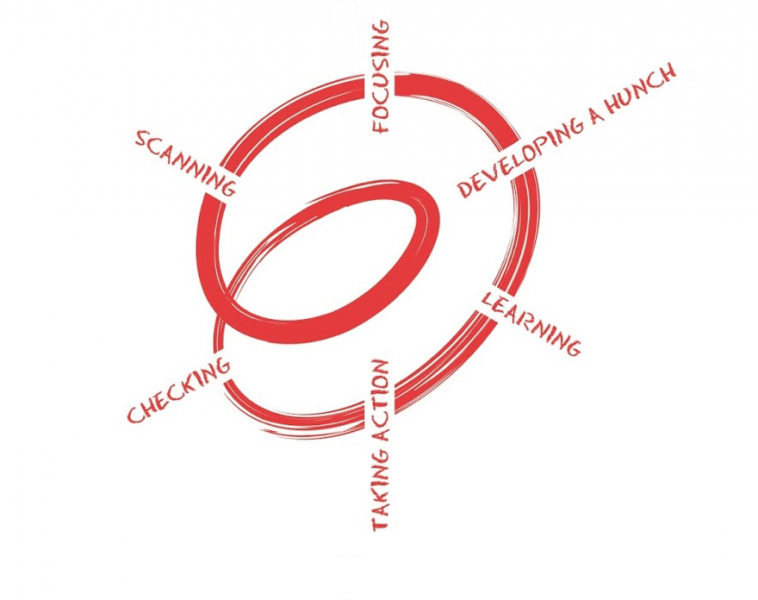
At the beginning of my learning, I didn’t understand what inquiry really was. It felt like this buzzword that haunted the halls of the university. While I was mostly unsure of what was required for inquiry, I knew that at the very least I had a mind filled with wonder and ideas. Like a tumbleweed, the ideas and curiosities began to tumble through and then disappear out of sight. It wasn’t until entering Harwin that we were asked to narrow down our curiosities into a single inquiry that we could study. I was confident, some would say overconfident. I had all of these thoughts, all that I had to do was catch a single tumbleweed and hold on. Sitting in the Harwin library I decided I was going to look at how trauma-informed practices and a harm reduction lens were being applied at the classroom level. I had experience with this content and there was no reason that I couldn’t identify the presence or absence of the concepts.
This is where I think things began to take a turn. I wasn’t pushing myself to look at something new. Im not sure I was even actually looking at anything. This inquiry felt reminiscent of those moments when you’re driving home and suddenly you realize you were mentally absent for a stretch of road. I knew this content area so well that I wasn’t doing any real work. I also realized that while the subject is important, there was no fire of passion to dig my hands deep into the material and find out what lies at the bottom.
I had to continue with my work, and deciding that I was stubborn and would be able to fill in the blanks with what I already knew, I diverted my attention to ‘more important’ areas of study. I found a passion for assessment, and a hesitancy to pursue the subject because there is so much unknown. I have lots of amazing ideas of what assessment could look like with students as the drivers, but no tangible ideas on how that would actually look.
Today, in the first week of my final term of this program, I realized that my inquiry may follow many different ideas but it truly is a study of myself. I have written in this portfolio that I am still finding out who Karlea is and can be. I don’t know if she is a teacher with a 30 year career, or if she will become a novelist who hides out in the solitude of her home. My hunch is that I am caring in everything that I do and that I have a desire to continue learning what being myself in the various roles my life requires means.
The only action I can currently take is to push forward and trust my learning process. Hope that I can see value in the decisions I make, and be humble when I find success and failure. The humility required for this profession will be the vehicle that drives my reevaluation of who I am and what makes a strong and good professional.
Do I think this is what I thought my inquiry would look like? Not really, but I think this is what resonates the most with where I am in my learning. I don’t think this is an easy option, but I think this is where I am currently needing the most growth.
1 day post 10-week practicum:
I have learned a lot in the past 10 weeks. I have learned that connection is the centre of who I am. Karlea as a teacher is someone who will not settle for a surface-level connection to students. I value a connection that allows me to truly understand what is driving the students and then support them in their dreams. I feel stronger knowing that when those students leave my class, they will know that they were truly cared for, and will always have a cheerleader. I had this epiphany when I was speaking with one of my students who had been suspended, and then ostracised by her peers. They did not agree with her choices and had very little trust in her. This student looked at me and said
“Ms Simmonds I am a bad person, who no one will ever like, and I deserve that.” I was shocked that this 12-year-old was essentially writing herself off over a single mistake. I was speechless and ready to cry. She asked me why I looked so upset, and I told her that I could not believe that she thought that. I told her that the student I saw was so incredibly sorry for making this mistake, and was working to rebuild that trust every chance she got. I told her that she was so valued in the classroom by myself, and peers that she maybe wasn’t seeing. I told her that when we make mistakes, it does not make us bad people, but instead makes us real people. The fact that she could see those mistakes and wanted to do better next time was the actions of an amazing person.
I know that often the words of an adult are lost to the ears of a pre-teen, but this time she heard me. I was so excited because this meant that I did have a connection with the students. This meant that when I was trying to be authentic, the students could see that and were responding to it. This meant… Karlea can be a community-focused teacher who puts the needs of her students first and still can give quality academic support.